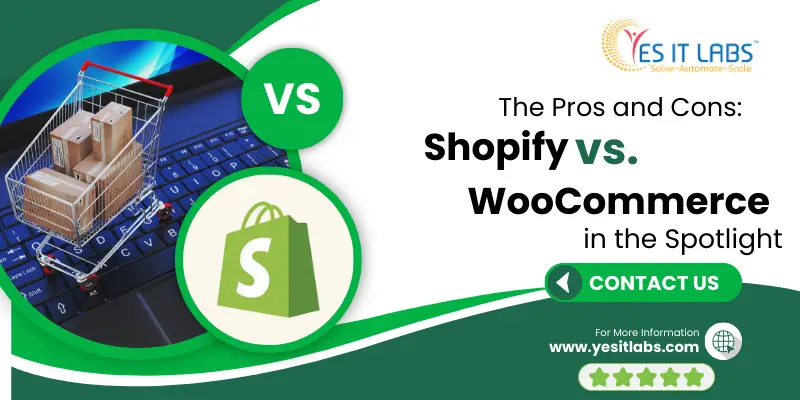

Breaking It Down: WooCommerce vs. Shopify for E-Commerce Dominance
In the vast landscape of e-commerce, selecting the right platform can make or break your online venture. Among the plethora of options available, two giants, WooCommerce and Shopify, stand out as top contenders. To aid you in this decision-making process, let’s delve deeper into the intricacies of each platform, exploring their features, advantages, and drawbacks.
Shopify Website Development: A User-Friendly Journey
Shopify’s Intuitive Interface:
Shopify has earned its reputation for being exceptionally user-friendly. Entrepreneurs, regardless of technical expertise, can leverage its straightforward interface to create a visually appealing online store. With a variety of customizable templates and a drag-and-drop builder, the process of setting up shop is remarkably simple.
Hosted and Hassle-Free:
One standout feature of Shopify is its all-in-one package, including hosting services. This eliminates the need for external hosting providers and alleviates concerns about server management. The hosted nature of Shopify ensures a secure and reliable foundation for your e-commerce business, allowing you to focus on what matters – growing your brand.
App Ecosystem for Enhanced Functionality:
If you’re looking for Shopify development services, Shopify boasts a robust app ecosystem, offering a diverse range of third-party integrations to enhance your store’s functionality. From marketing tools to inventory management, the app store provides a convenient marketplace to tailor your online business according to your specific needs.
WooCommerce Development Company: The Power of Customization
Seamless Integration with WordPress:
WooCommerce, in contrast, operates as a plugin for WordPress. If you’re already using WordPress for your website, integrating WooCommerce seamlessly transforms it into a fully functional online store. This interoperability offers flexibility and control, especially for those already familiar with the WordPress environment.
Open-Source Flexibility:
An intrinsic advantage of WooCommerce is its open-source nature. This means developers can dig into the code, tailoring and customizing the platform to meet unique business requirements. For businesses with specific design or functionality needs, partnering with a WooCommerce development company ensures a tailor-made solution.
Cost-Effective Nature:
For small to medium-sized businesses conscious of their budget, WooCommerce emerges as a cost-effective option. Unlike Shopify’s subscription-based model, WooCommerce is free to use, requiring businesses only to cover the costs associated with hosting and any additional premium extensions they might choose.
SEO-Friendly WordPress Integration:
Leveraging the power of WordPress, WooCommerce websites inherently possess strong SEO foundations. This can be a significant advantage for businesses looking to improve their search engine rankings and overall online visibility.
Shopify Development: The Pros and Cons
Pros of Shopify:
- User-Friendly Interface: Shopify’s intuitive design makes it accessible for entrepreneurs of all technical backgrounds.
- Hosting Included: The platform’s hosting services are reliable and secure, alleviating concerns about server management.
- App Ecosystem: A diverse range of third-party integrations available in the app store enhances the functionality of your store.
Cons of Shopify:
- Transaction Fees: Users may incur transaction fees if they choose not to use Shopify’s in-house payment gateway, impacting profit margins.
- Limited Customization: While user-friendly, Shopify may not offer the same level of customization as open-source platforms like WooCommerce.
WooCommerce Development: The Pros and Cons
Pros of WooCommerce:
- Open-Source Flexibility: WooCommerce’s open-source nature allows for extensive customization, catering to specific business needs.
- Cost-Effective: The absence of monthly subscription fees makes WooCommerce a cost-effective option for smaller businesses.
- SEO-Friendly: Leveraging WordPress, WooCommerce websites inherently possess strong SEO foundations.
Cons of WooCommerce:
- Technical Expertise Required: Setting up and managing a WooCommerce store may require a certain level of technical expertise.
- Hosting and Security: Users need to manage their hosting, ensuring security measures are in place, which may be overwhelming for those unfamiliar with web hosting.
Making the Decision: Considering Pros and Cons
As you weigh the pros and cons of WooCommerce and Shopify, consider your business’s unique needs, budget constraints, and your comfort level with technical aspects. Shopify’s user-friendly approach might be ideal for those seeking a hassle-free experience, while WooCommerce’s open-source flexibility could be the answer for businesses with specific design and functionality requirements.
Before making a decision, ask yourself: What are the pros and cons of WooCommerce and Shopify for my business? Factor in your budget, technical skills, and the level of control you desire over your online store. Remember, there’s no one-size-fits-all solution in the world of e-commerce – your choice should align with your business goals and pave the way for sustainable growth.
Conclusion:
In the dynamic realm of e-commerce, the choice between WooCommerce and Shopify boils down to your business’s unique needs and aspirations. If you prioritize a user-friendly experience, Shopify’s intuitive interface and hassle-free hosting services make it a compelling option. The extensive app ecosystem further ensures that your store can evolve with your business, adapting to changing demands seamlessly.
On the other hand, if customization and flexibility are paramount, partnering with a WooCommerce development company could be the key to unlocking your store’s full potential. WooCommerce’s open-source nature empowers businesses to tailor every aspect of their online presence, and the cost-effective model makes it particularly appealing for smaller enterprises mindful of their budget.
Consider the pros and cons outlined for each platform, weighing factors such as technical expertise, hosting preferences, and budget constraints. Shopify’s accessibility may be the right fit for those seeking simplicity, while WooCommerce’s open canvas is ideal for businesses with specific design and functionality requirements.
Ultimately, the decision rests on aligning your choice with your business goals. Remember, whether you opt for the user-friendly journey of Shopify or the power of customization with WooCommerce, there’s no one-size-fits-all solution. Your selection should pave the way for sustainable growth, ensuring your online venture thrives in the competitive landscape of e-commerce.
Tags: Best Shopify development company, Shopify development services, woocommerce developer services, WooCommerce development, WooCommerce development company
















